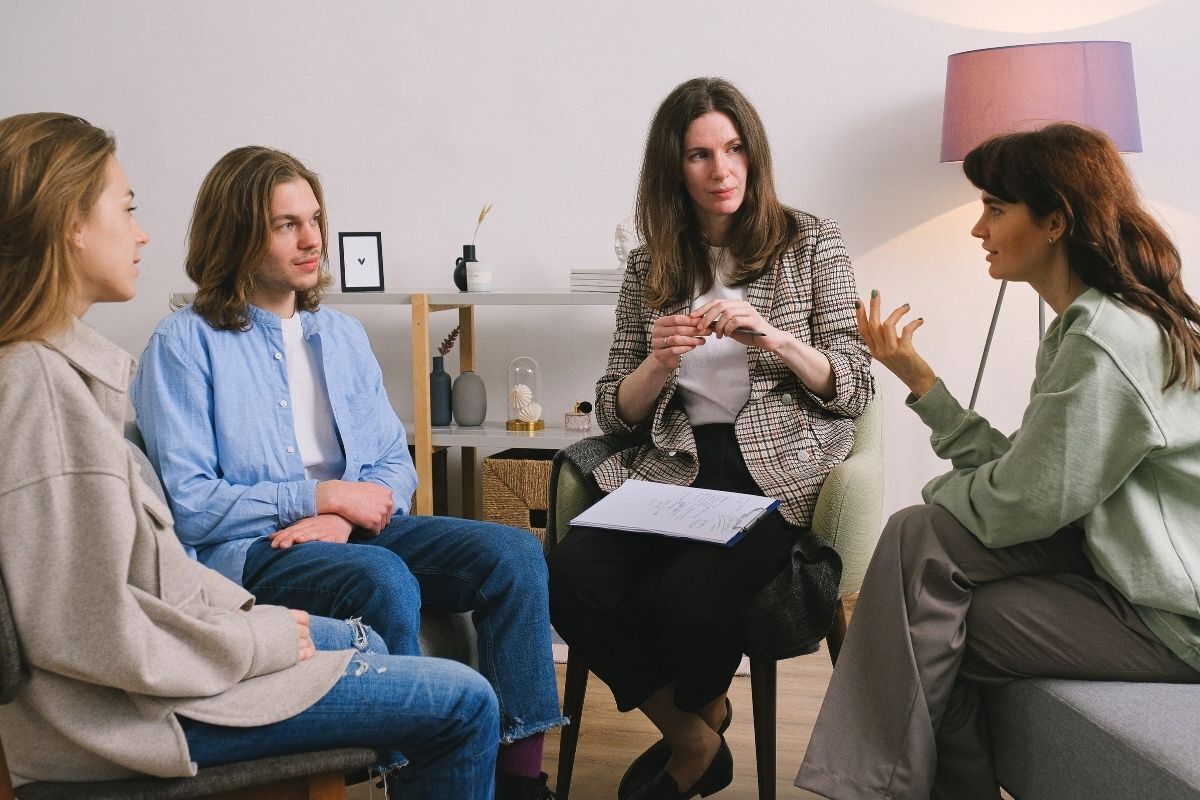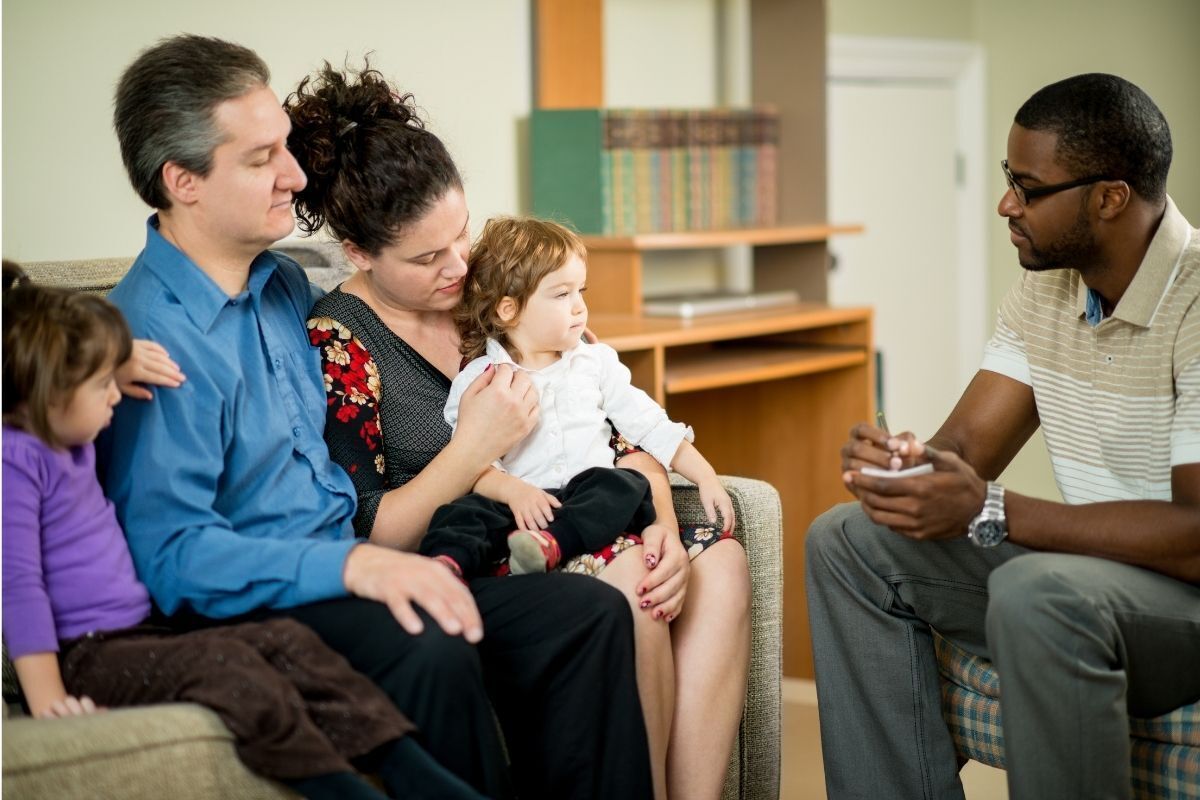Table of contents
Learn all about family therapy!

By portraying living together, family therapy usually works on the communication of the members and tries to manage conflicts that may arise in the middle of the treatment. This system seeks to establish a better environment, full of harmony, trying to solve problems that some constitution may have.
With a definition that can be quite complex these days, the word "family" characterizes strong ties that a person has as a foundation in his or her life. Whether they share DNA or not, all it takes is a meaningful connection. Moreover, these relationships are essential for strengthening mental and physical health.
Family therapy can be important in any circumstance, especially when seeking balance to conduct relationships. Regardless of the problem that needs to be solved, the family dynamic needs strengthening capable of making everything more peaceful and aiming at everyone's well-being. Read the article to understand everything about family therapy!
Understanding more about family therapy

To handle group counseling, family therapy seeks to include everyone who is part of a direct relationship or not. The focus is on the most intense and dynamic interactions, seeking to hear both sides, regardless of how many.
Varying according to each need, it can be short or long term. Specific goals are addressed, mainly trying to explore conflicts, patterns, attitudes, and forms of communication among all the members of the family system.
This treatment can be guided by approaches that emphasize evidence, and the professional can use elements that match the purpose of the consultation, making approaches capable of reaching a more concrete definition. Read on to understand more about family therapy!
What is family therapy?
Acting as an accompaniment capable of helping some or all of the members, family therapy aims to rebuild and conquer balance within a formulation. Thus, it intends to implement more respect, resolution, and dialogue in problems that come to interfere in a negative way.
Conflicts can be emotionally charged in relationships, especially due to differences in age and customs. Thus, in therapy, strong personalities can be guided towards a specific issue that may be hindering well-being. Here, the psychological disorder can also be worked on.
Origin and general principles of family therapy
Family therapy emerged in the 1950s in the United States, with principles capable of transforming several areas. This type of therapy has been expanding since World War II, not only because of social relationships, but also because of the great industrialization, and the participation of women.
In the face of all these definitions, the feeling was one of great optimism about the future, increasing more and more family constitutions. Thus also came the determination that all formulations were based on happiness.
Relationship with systemic psychotherapy
The purpose of family therapy in conjunction with systemic psychotherapy is to make a connection with all the relationships that surround it. Here, the professional usually does a lot of analysis, mainly to treat the difficulties and some disorders that may appear.
Using clinical, technical, and theoretical methods, it helps a particular person to know how to conduct his or her social relationships. It tries to define awareness about certain difficulties, using the implementation of new behaviors, feelings, and attitudes.
When and for whom is family therapy indicated?
Giving the indication of a treatment that seeks to act on people who have behavioral problems, family therapy portrays communication interference, changes in constitution, the death of a loved one, separation, divorce, etc.
Problematic issues between children and parents can also be addressed, with calls that address complicated parenting relationships, stressful transitions, trauma, sibling conflicts, and more.
How does family therapy work?
Each family therapy session works with a group or just specific individuals in the constitution, using an incentive for everyone to talk about their respective disorders. Here, dialogue is essential, and is used as the gateway to therapeutic care.
While one person speaks, the others listen with the implementation of empathy. Everyone is put to understand the other person's side, trying to change certain behaviors, attitudes, and speech. This process can be done in a circle or on a couch.
Types of family therapy

Family therapy has its various modes, all of which aim at the same purpose, which is to keep relationships healthy and harmonious. Thus we have Bowenian and structural therapy.
The first has a formulation capable of working on individuality, in conjunction with the emotional process. As for the second process, it focuses on structuring the family's behaviors. It creates a certain methodology that will be addressed for each of the problems.
There is also experiential psychotherapy, which is able to take in some lived body experience, containing great chances for progress. Keep reading the article to find out what are the types of family therapy!
Structural family therapy
Developed in the 1960s by Salvador Minuchin, structural family therapy relies on the idea that emotional problems can develop in children and adolescents. Thus, it primarily uses family structures that are dysfunctional.
Addressing the understanding of all boundaries, it highlights the subsystems within a constitution, as well as the interaction capable of acting productively. This method can still focus on appropriate constraints, containing the strengthening of a family's relationships.
Bowen family therapy
The Bowen family therapy process emphasizes the balance of each individuality, using closeness and adding all the strengths that are essential to relationships. Here, everyone can work on their respective personalities.
Being able to learn more to take responsibility, all acts are built with individualistic support. Therefore, it causes to review behaviors, attitudes, and conflicts that can get in the way of a family's well-being, needing to maintain harmony.
Experiential family therapy
Being complex, experiential family therapy can implement many approaches, mainly to try to recreate a certain experience. In it, the unconscious is worked on, used to its fullest and having the integration of the conscious and the occurrences.
There are societies that work with this method, keeping the focus on this determination and helping to find the balance that many seek.
Strategic Family Therapy
By using a brief and direct focus, strategic family therapy gets all the members of a constitution interacting with each other, adding to the presentation of problems or symptoms. By giving the openness to communication, a particular person can improve his or her behavior.
Thus, the conflict is addressed. Everyone shows how they feel in this relationship, with the professional helping to fulfill their respective roles. Belonging is highlighted, including the purpose that such a nucleus cannot practice exclusion.
Benefits of Family Therapy

Family therapy can bring several benefits to a formulation, mainly by strengthening all the bonds that contribute to everyone's development and having significant changes capable of strengthening the scope. It also works on self-control and self-knowledge, bringing well-being.
With personal responsibility assisted, patients are able to improve their quality of life, with the principle that everything can be healthy for everyone. Continue reading the article to understand what benefits family therapy can implement!
Strengthens family ties
Giving the possibility to strengthen the bonds, family therapy brings sincerity as something to be worked on, especially to say what bothers each other. In it, caring can be developed, opening your heart and being sincere with what you are going through.
Difficulties can be understood by understanding with the professional there. People can keep secrets from their parents or vice versa, but depending on the situation, some things cannot be kept as individual secrets.
Causes a change in relationship patterns
Certain patterns in relationships can be worked on in family therapy, aiming to improve something that can bother or hurt. A reflection needs to be constituted, mainly for each one to try to add attitudes that will be healthier.
For success in each session, the method needs to be according to each person's understanding, aiming for cooperation and empathy, and addressing issues that may be uncomfortable, but only with the main purpose in mind.
Helps to develop self-knowledge and self-control
Self-control and self-knowledge need to be together and in full balance, and can add even more in a family therapy and highlighting issues that can bring out these processes in each member of a family. Using also interpersonal communication, you will be able to work on understanding.
With these aspects, satisfactory results can be seen gradually, using precisely the accompaniment of a qualified therapist and with the approval of the patients treated. Everyone will leave satisfied and ready to express themselves.
Increases personal responsibility
By increasing each person's personal responsibility, family therapy will act to guide each individual and how they should behave in their attitudes, speech, and behavior. By putting everyone at ease, it shows each person's role in the structure.
Each person will become capable of assuming his or her respective responsibilities, even assuming their own mistakes or avoiding doing something that could be harmful to another. In this way, therapy makes the relationship within the family environment something that can provide well-being for all.
Promotes a familiar team feeling
Feelings developed in family therapy can convey and promote a team circumstance, especially aiming to reach out if someone needs it. The support needs to be mutual and shared, given all the great benefits.
With therapy, productivity will increase, fully driving all relationships. Also, everyone will be able to promote activities that engage and engage, adding that feeling of reciprocity. A certain employee may feel motivated and proud, developing empowering emotions.
Helps to overcome problems and pains of the past
Not only highlighting the fact that problems need to be overcome in family therapy, pains also need to be handled well. Both feelings may help to understand something that has hurt and make a re-evaluation.
The overcoming will come, by changing behavior, attitudes, and speech, and by strengthening these bonds in the constitution.
Improves the patient's quality of life
By having a better quality of life, patients treated in family therapy can find well-being with this method. By building actions that will only strengthen, the first step must be taken and understood to change habits that were bothering.
Gradually, all those treated will feel a marked improvement, thinking long and hard before committing an act that could hurt another. Speeches will be analyzed, asking questions that will change the course of situations and implementing what will be constructive for everyone.
Further information about family therapy

Next, we will present the differentiations amidst processes that can be similar to family therapy, such as family constellation, couple therapy, approaches that fit each need, etc.
By characterizing the importance of this method, it is possible to show how to do it, the role of the psychotherapist in the sessions, the amount to pay, the negative points that complement all the purposes of therapy, etc. Read the following topics to stay on top of other family therapy information!
Is family therapy the same thing as couple therapy?
With the same foundation of strengthening the constituent bonds, family therapy and couple therapy are based on the same purpose. The difference is that the former aims to attend to all members of a family, making one session to focus on them.
Thus, the second option meets the objectives that make it difficult to strengthen the relationship, including the inability to reach consensus, by assisting both parties and with their respective individualities.
Is family therapy the same thing as family constellation?
Whereas family therapy aims to seek professional help to point out problems, complaints, difficulties, and conflicts, family constellation aims to analyze more critical issues in a session. The constellator, who is the therapist, and the other party is the family.
The nucleus also intends not to practice exclusion among the members, keeping the same conversation, taking away stress and delivering harmony. Here, grandparents, cousins, uncles and brothers-in-law must participate, mainly because they all contribute to the composition of the family tree.
Which family therapy approach to choose?
The approach that should be chosen in family therapy needs to fit each perspective and need. Thus, there are many options that can help the process of family reconstruction, given the difficulties that can be uncomfortable.
Containing the behavioral, the psychodynamic, and the structural, members must evaluate all the issues, understand each process, and decide which one best fits the purposes that need to be addressed with attention, patience, and persistence.
Effectiveness of family psychotherapy
Family therapy is also useful for noticing problems that hinder relationships, and there may be feelings that hinder development and cause distress. Mood disorders such as psychosis and anxiety can be worked on.
Alcohol problems can be addressed by making recommendations for physical and chronic illnesses, and by questioning certain behaviors, abuse and neglect. Violence can still be addressed, bringing a more delicate sense and needing other techniques.
How to do a family therapy session?
The process of family therapy needs to be done with solid bases that the professional sought can offer, mainly relying on theories and principles.
Depending on the situation in the family setting, the needs are considered according to the problems that need to be assessed and improved. Questions will be asked, in view of the understanding that the therapist will need to have, including other factors that may have a direct connection.
What is the role of the family therapist?
The family therapist's role is based on the correction of mistakes that can be significant. Thus, he tries to solve problems that interfere in the relationships, modifying postures for the benefit of everyone's well-being.
By highlighting the issues that hinder the coexistence, the portrayal comes to create a dynamism capable of strengthening all ties. Thus, the sensations of each person are addressed, in order to listen to the experience of each person in the family circle.
Price and where to have a family therapy session
Having variations in values, family therapy usually has an average of R$ 325 reais, and the most affordable is the one that approaches R$ 200 reais. Depending on the function and time, each one fits the needs and purposes of the patients.
Some places address these methods, and the individual can be helped by schools, colleges, etc. Public systems also provide this support for people who cannot afford the sessions.
Negative points of family therapy
The downsides of family therapy present themselves in the individuals who feel disturbed. These issues are essential to conduct, mainly because problems will be addressed, including those of emotional conflicts.
In some cases, the people present may feel uncomfortable, taking time to adapt, and varying from individual to individual. It is important to emphasize that the professional will be there to help everyone, trying to understand everyone's motives and aiming for an implementation capable of solving the problems.
Enjoy all the benefits of family therapy!

There are many benefits that can be found with the help of family therapy, as it can restore many negative points. With the principle of strengthening the bonds, discomforts may be presented, indicating formulas capable of leaving the sphere in full harmony.
Balance can also be found, using this role as a gateway to the best things that should be addressed for the well-being of the family unit. Honesty and courage are purposes that can evolve all members, and are basic requirements for reconstruction.
Ego and pride must also be left aside, not creating any kind of obstacle and making one see reality. All constituents must be in agreement with this method, aiming to cooperate with the therapist's work and giving the therapist space to start acting in front of the situations that cause discomfort.

